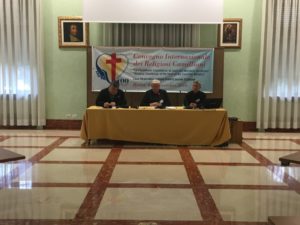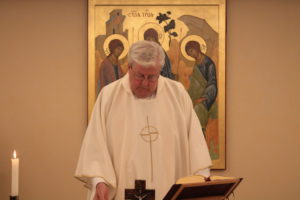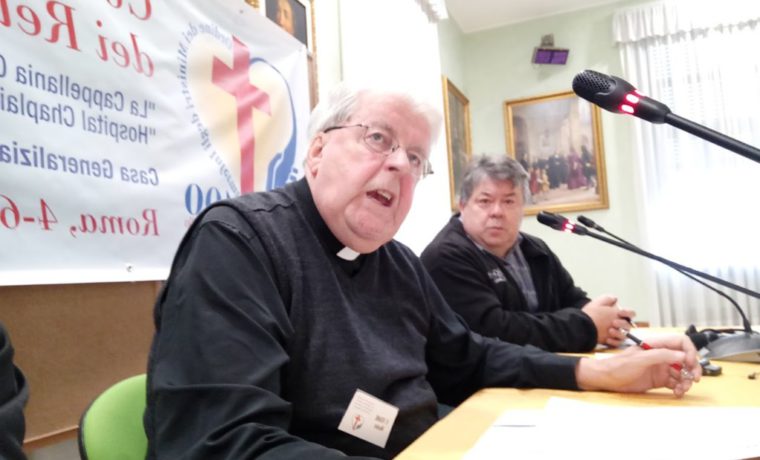 Most hospital chaplains know their job and how to go about it. Most of us know that we could and should be much better at what we are doing, and that we can always learn more and be enriched by new insights. You cannot be taught how to be a hospital chaplain, but you most certainly can be helped to be a more effective one through greater self-knowledge and knowledge of the human sciences. However, it is important that we don’t become too engrossed too engrossed in theory and in the process lose contact/touch with the stress and trauma encountered at the coalface of an ever changing hospital ministry.
Most hospital chaplains know their job and how to go about it. Most of us know that we could and should be much better at what we are doing, and that we can always learn more and be enriched by new insights. You cannot be taught how to be a hospital chaplain, but you most certainly can be helped to be a more effective one through greater self-knowledge and knowledge of the human sciences. However, it is important that we don’t become too engrossed too engrossed in theory and in the process lose contact/touch with the stress and trauma encountered at the coalface of an ever changing hospital ministry.
I believe that these days together should be characterised by sharing honestly the reality, the difficulties, challenges and what exactly it is that helps us to keep going. So I hope that I can be authentic in this presentation, as I reflect on my own life, and my motivation in the light of the reality I see around me at this moment in the history of the Order and of my own wee province, and my personal response to it all.
I see before me chaplains from the four corners of the world. And as I look out at you I am very aware that the reality of chaplaincy ministry as exercised in Africa, South America or Asia is light years away from that of Europe and North America. I am sure that this issue will surface strongly in the group work and perhaps in other presentations. What unites us all however, is that our Camillian Charism has to be the driving force for all of us as we seek to meet the challenges presented to us by the diverse cultural surroundings in which we work. Our charism is one of our main sources of motivation for doing what we do and never changes. How we express that charism will be constantly changing depending on the reality we have to encounter. Values don’t change while structures must, and our charism is one of our central values.
I am called to be prophetic where I am planted. Yes, the charism will find various different expressions because of the reality of the environment in which we have to minister, but the source of our motivation will be our charism. And I need to remember that by the very nature of my religious profession I am called to be prophetic.
Motivation is of paramount importance if we are to be prophetic. We should never lose sight of the fact that our ministry must always have a strong evangelising dimension, which if missing means we are not doing our work, that we are no longer in mission. We should always be on guard against losing our sense of mission as “when we are clear about the why we can face any how” (V. Frankl). This happens when our identity and motivation are clear. The fact that we are involved in pastoral activity does not of itself mean we are involved in ministry. We are involved in ministry “when both our lives and our actions spontaneously indicate and promote the Kingdom of God” (M. Amalodoes).
If we are true to our charism our ministry will always have an evangelising dimension. So a very pertinent question for all of us is to ask ourselves just how alive is that charism for each one of us right now? Do we burn inside like Camillus?
The healthcare world offers us enormous possibilities for evangelisation. More people pass through the doors of a hospital in a day than through the doors of a Church in a week. No one escapes being hospitalised or of having to visit somebody who is there. Did Camillus not see the hospital as “the mystical vineyard of the Lord” where the “sick are our Lords and masters”
 I believe that the greatest challenge facing us as Christian people, especially in the western world lies in the area of faith. Our challenge lies in our ability and willingness to face an uncertain future with joy. Only the other day the Archbishop of Dublin, Dermot Martin, remarked that “faith is now a foreign language”. What a challenge for chaplaincy ministry where the traditional language of sacrifice, suffering, the cross, trust in God, the Our Father, are fast becoming for people mere words in a dictionary which needs consultation to be understood. Only a short few years ago all the patients and staff with whom I was called to work came from the main line Christian Churches, I now find myself confronted by all beliefs and none (well over a 100). In such an environment our Christian future would appear to be more uncertain than ever. Are we men and women of Christian hope, who are prepared to continue doing what we do because it is the right thing to do, independent of the consequences, without looking for results? This is part of being prophetic.
I believe that the greatest challenge facing us as Christian people, especially in the western world lies in the area of faith. Our challenge lies in our ability and willingness to face an uncertain future with joy. Only the other day the Archbishop of Dublin, Dermot Martin, remarked that “faith is now a foreign language”. What a challenge for chaplaincy ministry where the traditional language of sacrifice, suffering, the cross, trust in God, the Our Father, are fast becoming for people mere words in a dictionary which needs consultation to be understood. Only a short few years ago all the patients and staff with whom I was called to work came from the main line Christian Churches, I now find myself confronted by all beliefs and none (well over a 100). In such an environment our Christian future would appear to be more uncertain than ever. Are we men and women of Christian hope, who are prepared to continue doing what we do because it is the right thing to do, independent of the consequences, without looking for results? This is part of being prophetic.
I look at secularised Europe today and I ask myself: Is there anything which is still considered as sacred? Are we still capable of wonder? What exactly touches us deeply? Is there something there that can lift our spirit? And this is the reality in which I am called to be prophetic. If we are to be prophetic it has helped me if I distinguish Secularism and Secularisation.
Michael Paul Gallagher describes secularism as a way of perceiving the world in which there is no room for the transcendent, the divine, the supernatural. We can say that God is missing and his absence is not felt.
Secularisation however is a life process through which life, at a personal and social level is freed from the detailed control of religion, while it still remains, in great part illumined and guided by faith. Secularisation wants its own autonomy but not necessarily its independence. Secularisation is not necessarily, he maintains, the enemy of discipleship, nor of the Christian mission.















Camillians on Facebook
Camillians on Twitter
Camillians on Instagram